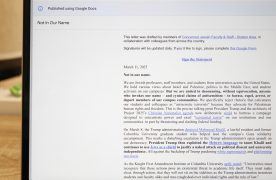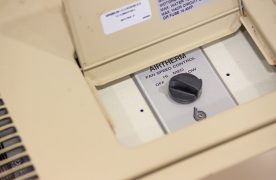Your mother and best friend were wrong. There aren’t plenty of fish in the sea. There are so few, in fact, that the next time you crave a tuna wrap you might have to settle for a jellyfish sandwich.
Until recently, scientists possessed only local proof of fish decline, such as the disastrous collapse of the cod fisheries in New England and Newfoundland, Canada. In reality, “the problem is profound, on an ocean-wide scale,” said Daniel Pauly, of the University of British Columbia Fisheries Centre.
Pauly is one of many marine scientists who warn that only emergency measures can protect the world’s ocean ecosystems. Pauly likened his study — which mapped the ocean-wide status of fisheries in the North Atlantic — to the evening weather forecast. The outlook, he told the annual meeting of the American Association for the Advancement of Science last month, is not sunny.
According to the study, the global catch of tuna, haddock, flounder and hake has decreased by more than half over the last 50 years and the fishing effort has tripled. While fisheries such as George’s Bank in the North Atlantic are showing recovery for some fish species, marine scientists say that countries are still pouring more money into developing fisheries than into their protection. If we don’t regain control of the fisheries, “the definition of what a fish is will change,” says Pauly. “There will be fisheries for plankton in a few decades.”
The ocean has become a battlefield, pitting fish against the military technology that has filtered into fisheries. Sonar mapping, satellite navigation and imagery — tools developed for submarine warfare and espionage — expose every crack and canyon to fishers. These sophisticated techniques have allowed fishers to “peel the lid off the oceans,” said Callum Roberts from the University of York in Britain.
Philip Lobel, an Associate Professor of Biology at the Boston University Marine Program in Wood’s Hole, says that declining fish stocks is not the only issue.
“It’s not that we destroyed the cod population,” he says, “it’s that we destroyed an ecosystem.”
“It takes only one pass of a trawl to destroy a 5,000 year old reef,” said Roberts, who is calling for the creation of no-fish zones in threatened-yet-fertile marine regions.
Roberts recently identified 18 such regions among the world’s coral reefs, including two that lie in the West Caribbean and the Gulf of California. Studying 1,700 species of reef fish, 804 species of coral, 662 species of snail and 69 species of lobster, Roberts and his colleagues demonstrated that many marine species are endemic — that is they live in a restricted region — and risk extinction.
This study contradicts others that have pegged marine species as resilient to extinction because of their widespread geographic distribution. Convinced that no quota schemes or control efforts can save the sea life in these hotspots, Roberts said the only solution is to create marine reserves that are off-limits to fishing. He suggested that satellite monitoring could regulate those who choose to fish in protected waters.
Marine reserves, while a valuable tool, will not stop the destruction of ocean ecosystems, said Andy Rosenberg, a fisheries scientist at the University of
New Hampshire. Rosenberg advocated the creation of marine reserves, but only if the size of fishing fleets is reduced and government subsidies are abolished as well.
“They are an incredibly useful tool,” he said, “but it’s not sufficient.” Lobel agreed. While he said there is “no question” about the value of marine reserves, they will not be a silver bullet. A New England fishery is not the same as one in Indonesia, he says. The fish are different, as is the method of exploitation. Indonesian groupers are fished out of the corals with dynamite explosions.
Rosenberg, however, disagreed with a fishery-by-fishery approach to marine
management. He compares the ocean’s marine resources to a water balloon.
“If you squeeze it one place, it will squish out somewhere else.”
The boats, he said, will simply fish elsewhere. A marine reserve, much like a protected stand of California redwoods, can do a lot for the ecosystem confined within its boundaries. But once it established, someone has to monitor it.
“The problem with protected areas is enforcement and regulation,” he says. “Who’s going to pay for it?”
This is an account occasionally used by the Daily Free Press editors to post archived posts from previous iterations of the site or otherwise for special circumstance publications. See authorship info on the byline at the top of the page.












